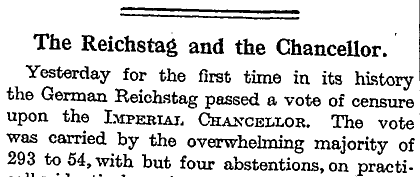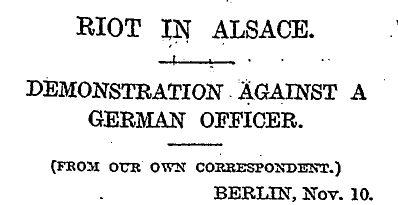We are developing the social individualist meta-context for the future. From the very serious to the extremely frivolous... lets see what is on the mind of the Samizdata people.
Samizdata, derived from Samizdat /n. - a system of clandestine publication of banned literature in the USSR [Russ.,= self-publishing house]
|

Partly due to despair at my unwillingness to decorate my flat in any way whatsoever, and partly because she knows I like this kind of thing, a friend of mine sent me this antique map of central Europe as a gift. She obtained it in an antiquarian map shop in Krakow, Poland.
First, obvious observation. This is a map from Nazi Germany. In the margin, it is identified as being the product of a mapmaker in Leipzig, but there is no date given.
Secondly, when I see a historical map, I like to play the game of figuring out the dates of the map by looking at the border, and using my historical knowledge of political geography to narrow the date down.
Figuring out the year of this map is easy. This map is from 1939. In most instances, getting the year is all you want to do. However, 1939 was a somewhat problematic year.
Klaipeda and the area around it is shown as part of Germany, not Lithuania. Also, Czechoslovakia has ceased to exist, Bohemia and Moravia has been annexed by the Reich, Slovakia is a supposedly independent country, and Carpathian Ruthenia has been invaded and annexed by Hungary. All these events occurred in March 1939, so the map was clearly designed after March 1939.
It’s looking at Poland that things get interesting. Firstly, Danzig is not shown as a free city, but is shown as part of the Reich. Danzig was invaded by Germany on 1 September 1939, proclaimed part of Germany on 2 September, and formally annexed under German law on 8 October. Danzig had, however, been under the control of the local Nazi party since 1933, and would have joined Germany instantly if it had been allowed to under international law. Is it possible that some German maps showed Danzig as part of Germany prior to September 1939? Possible, but I suspect probably not.

By far the most fascinating thing in this map is the red line through Poland, however. Poland is clearly identified as “Polen”, but the Molotov-Rippentrop line – it the limits of German occupation after the invasion of Germany in September 1939 – has been drawn through it. Therefore the map must have been printed no earlier than September 1939. This has clearly been printed at the same time as the rest of the map – it is not something someone added with a pen later, or anything like that.
What I suppose is possible is that the mapmaker had a map prepared reflecting recent border changes immediately prior to the German invasion of Poland in September 1939. When the invasion occurred, the map was quickly modified to show Danzig as German and the zones of German and Soviet occupation before being printed and sold.
And yet, this map does not reflect the view of the world that the Nazis wanted to present. Upon invading Poland, they declared that Poland as a country did not exist. On that same date of October 8, Germany formally annexed the northern and western sections of their Polish conquests (including the Suwalki triangle, clearly shown on this map), and declared the South-East to be the “General-government”, essentially a German colony (but not a “Germany colony in Poland”, as Poland did not exist). This map is therefore curious, as it essentially shows Poland (clearly identified as Poland) under German (and Soviet) occupation.
I cannot imagine maps like this being printed in Germany long after the annexation decree of October 1939. In the Nazi view, there was no occupied Poland the way there was later an occupied France. There was simply German territory that unfortunately happened to have Poles, other Slavs, and Jews living in it. It’s easy to imagine foreign maps from later showing the German and Soviet occupation of Poland like this, but German ones, not so much. So my conclusion is that this map was printed very soon indeed after the German invasion of Poland in September 1939.
Plus of course this map ended up in an antiquarian map shop in Krakow in Poland, which between 1939 and 1945 was in that aforementioned “General Government”. One has no idea how and when it got there, but I suspect that “during the occupation” is the most likely answer.
Thoughts anyone?
Last Thursday, exactly a week ago, there were two speaker meetings occurring in London, both of which I wanted to go to, both addressed by Samizdatistas.
I picked the one at Christian Michel’s home, addressed by Philip Chaston, who talked about various efforts by English science fiction writers to talk up apocalyptic threats to mankind, such as climate threats and invasion threats of various kinds, by writing stories about such things actually happening. It was a very good talk. But because of attending that talk, I missed the talk given by Paul Marks to Libertarian Home that same evening, about the influence of Germanic thought upon the English speaking world.
My journey through tube-strike-deranged London to Philip’s talk looked like being – and in fact was – easier than the journey to Paul’s talk might have been, but I do confess that the biggest reason I chose Philip’s talk was my guess that Paul’s would soon be viewable on video. That guess has now been proved right. The talk only lasted a little over twenty minutes, and I highly recommend it. For those allergic even to that much video, Simon Gibbs has also appended some admirably detailed notes on what Paul said.
The big thing I want to add to what Paul Marks said is to emphasise the extreme importance of the subject he chose to talk about. Because of how the Germanic version of state-worship eventually turned out in the twentieth century, the Anglo-Saxon world has ever since been understandably embarrassed by how huge had been Germany’s intellectual and political influence upon it. The entire episode is well on the way to being forgotten by all but a few libertarians, of the Paul Marks variety. Yet for several decades, the military prowess of Prussia and then of the greater Germany that was assembled around Prussia, seemed to many like a crushingly effective argument for statism and against liberty. Even Germany’s World War One war effort, eventually an utter failure, was still a mightily impressive effort while it lasted. Both those who admired Germany’s intellectual and political notions and those who hated them believed such things to be necessary for national success. To put it another way, even those who hated Germanic political culture also feared it, and regarded it as something that simply had to be copied, rather as there was a similarly misguided little spurt of enthusiasm in the West for the methods of the Sputnik-era version of the USSR. But the urge to copy Germany went on for far longer and was far more strongly felt and defended and argued for. Germanic thought became dug into Anglo-American academia, for example, and the consequent intellectual poison has yet to be purged.
While most others prefer to forgot this story, we libertarians have everything to gain from keeping the memory of all this very much alive. We should all pay attention to the tale Paul told last Thursday, and be passing it on to everyone we argue with about both the attractiveness and the effectiveness of the freedom idea, in contrast to the kinds of ideas that deranged nineteenth and twentieth century Germany, and which are still deranging the world because of Germany’s earlier example.
A couple of weeks ago I blogged about the beginning of the Zabern Incident. Well, now it’s got a whole load more serious.
There have been further incidents in Alsace. Mainly these have involved locals insulting soldiers and the soldiers reacting with extra-legal brutality but they haven’t been without their farcical side. In one incident, the participants in a court case managed to get caught up in riot and various judges, clerks and advocates found themselves spending a night in the cells. In another, Lieutenant Förstner, the 18-year old who sparked it all, went out on a shopping trip. Normal enough if you discount the escort of four soldiers with bayonets fixed.
And now it’s reached the floor of the Reichstag. And the Chancellor, Bethmann Hollweg, has lost a vote of confidence.
 The Times 5 December 1913 p9 In a democracy (e.g. France which in this very week in 1913 has also no-confidenced its Prime Minister) that would mean it’s time for the Chancellor to pack his bags. But not in Imperial Germany. In Imperial Germany the Chancellor is answerable to the Kaiser not the Parliament. Democratically elected representatives can huff and puff as much as they like but they are not going to blow the Prussian Army’s house down. At least not for another 5 years.
This kinda sorta brings me on to an observation: the end of monarchy is a bloody and protracted affair. In England the process began in 1642 and was probably all over by 1700 and involved a couple of civil wars and a military dictatorship. In France it took about 80 years (1789-1871) and involved three revolutions, a terror and a twenty-year war. In Germany (at least the Western half) it lasted from 1914 to about 1948; in Russia from 1917 to 1989; in Spain from about 1920 to 1980. In each case millions died. Oh, and China of course (1911-1980).
The only exceptions I can find are Portugal (although that had a period of dictatorship) and Turkey (dictatorship again). Japan is almost impossible to categorise not least because you have to decide who you take as the monarch: the Emperor or the Shogun?
Getting back to Imperial Germany, the tragedy is that here we see them within touching distance of a proper, functioning democracy. So near and yet so far.
 The Times 11 November 1913 p7 The Saverne Affair (or Zabern Incident) occasionally gets a mention in discussions of the origins of the First World War.
It is one of those multi-dimensional disputes in which one conflict slams into another. One of those conflicts is a straight ethnic one – familiar to anyone with a passing interest in Northern Ireland – between Germans and Frenchmen. The other is between the German military and Germany’s burgeoning democracy.
So far, a German officer has been rude (or has he?) about the Alsatians and there’s been a riot. There will be further riots followed by votes of no-confidence in the government.
The point is that it served as a reminder to the French that Alsace had been lost in 1870, while in Germany, it demonstrated that democracy was advancing at the expense of the military. I believe that fear of losing their privileges was one of the factors that led Germany’s rulers to go to war.
What follows is the final part of a series based on a talk I gave at the end of August at one of Brian’s Fridays. See also Parts I, II, III, IV. & V
When reading about the time it is impossible to be unaware that in less than a year Europe will be plunged into war. It is not as if they are unaware of the risk. Churchill, hardly a pacifist, describes the prospect as “Armageddon”. A recent series of articles have appeared in the Times under the title “Europe’s Armed Camp”.
In the 1900s, Germany began to build up its navy. Britain responded. By 1913 Germany is ready to throw in the towel. Britain has not only shown herself prepared to outbuild Germany at every step but has raised a Territorial Army to fend off a potential invasion. She has also developed plans to send an Expeditionary Force to the Continent should the need arise.
Meanwhile and simultaneously, France and Germany have both expanded their armies.
It is worth spending a little bit of time describing the political systems in Central and Eastern Europe. Germany, Austria-Hungary and Russia all had systems that were partly monarchical and partly parliamentary. In Germany the Kaiser made all the appointments. The Reichstag was elected on a wider franchise than the House of Commons i.e. universal male franchise and it had the power to block the Kaiser’s bills including the budget.
Austria-Hungary had parliaments everywhere although the Hungarian was elected on an extremely restricted franchise and there were some magnificently complicated arrangements for making decisions, such as military spending that affected the whole empire.
In the wake of the 1905 Russian Revolution, a parliament, the Duma, was elected on a universal male franchise. It had rather too many socialists for the Tsar’s liking so the franchise was narrowed until he got something more acceptable. The Duma is not entirely powerless but does not appear to have any control over the budget.
The 1905 Revolution took place in the wake of Russia’s defeat in the Russo-Japanese War. This severly weakened Russia both on land and on sea. She has been rebuilding her forces but it is a slow process.
In the absence of a strong Russia, Austria has been having a field day in the Balkans. It annexed Bosnia in 1908, created Albania to prevent Serbian access to the Adriatic and has detached Bulgaria from her alliance with Russia.
And yet Austria is worried. Historians of the period love telling us how many times Conrad von Hötzendorf, Chief of the Austrian General Staff, urged war on Serbia. The number is well into the twenties. The Serbs make no secret of their desire to add the Austrian territories of Bosnia, Croatia and Slovenia to their own. The Austrians see this has highly destabilising: should Croatia go why not Bohemia, or Slovakia, or Ruthenia?
There are some extraordinarily disturbing ideas knocking around Germany. In his book “The Next War” General Bernhardi talks about the need to smash France, curb Britain and ignore treaties and other promises into the bargain. The Prime Minister, Bethmann-Hollweg, the “Good German”, talks of a coming race war between Teuton and Slav.
In addition to threats abroad they face threats at home. The Socialists are the largest party in the Reichstag and it is becoming ever more difficult to get their army and navy bills enacted.
 The Times, 5 August 1914 page 6
No one was killed, no one was injured. Do not excite yourselves.
From Adrian Hilton in the Spectator: Revd Dr Alan Clifford’s ‘homophobic’ comments referred to the CPS
The Criminal Justice and Immigration Act 2008 contains the offence of stirring up hatred on the grounds of sexual orientation. Anyone using threatening words or behaviour, or anyone displaying, publishing or distributing any written material which is threatening, is liable for prosecution. Former Conservative Home Secretary Lord Waddington won an amendment to an earlier version of the law, which established that no one might be prosecuted for stating their belief that homosexuality is sinful or wrong. It read: ‘For the avoidance of doubt, the discussion or criticism of sexual conduct or practices or the urging of persons to refrain from or modify such conduct or practices shall not be taken of itself to be threatening or intended to stir up hatred.’
But that protection will be illusory for as long as homophobia is defined and understood by the police as ‘any incident which is perceived to be homophobic by the victim or any other person’. Against that background, all mission-orientated Christians will need to temper their proselytism – especially on Gay Pride marches.
Dr Clifford tells me that Huguenot Calvinists are not easily intimidated, and that his faith in God is sustaining him: ‘I am not in deep shock: I enjoy perfect peace,’ he said. Others, of course, may not be so robust and may indeed prefer to pay a £90 fine. Much may depend on the tone and manner of the interrogating police officer.
From Damien Gayle in the Daily Mail via Tim Worstall: Armed police turn up at family home with a battering ram to seize their children after they defy Germany’s ban on home schooling
A team of 20 social workers, police officers, and special agents stormed the home of Dirk and Petra Wunderlich because they refused to send their children to state schools. The youngsters were taken to unknown locations after officials allegedly ominously promised the parents that they would not be seeing them again ‘any time soon’.
The only legal grounds for the removal of the children, aged from seven to 14, were the family’s insistence on home schooling their children, with no other allegations of abuse or neglect.
All suspicions which have been raised have been dispelled
– German interior minister, Hans-Peter Friedrich, referring to reassurances that British and US intelligence agencies “had observed German laws in Germany”.
It is compulsory to recite this quote in the voice of Cecil Baldwin from Welcome to Night Vale.
Dogs are not allowed in the dog park.
People are not allowed in the dog park.
All suspicions which have been raised have been dispelled.
Do not approach the dog park.
I would recommend clicking on the picture for the large version, in order to read the house policy of the establishment for the use of firearms on the premises.
My apologies for the poor quality of the picture. The light was dim, and I merely had a phone camera. I could have stolen the menu in order to get a better picture, I suppose, but I would not dream of violating the property rights of people of such obvious soundness.
I was rather pleased when my previous posting generated a large number of excellent comments – that’s not always the case. However, I was less pleased when many of them suggested (shock-horror!) that I might be wrong.
Many complained about my views on modern German music. Let me explain where I am coming from. As far as I am concerned rock (and I use the term in the widest possible sense) started in 1962, peaked in 1967/8 and had fizzled out by 1987. Very little of it was German.
A good example of this is provided by a programme called “Pop goes the Sixties” which occasionally gets repeated on the British channel Yesterday. Recorded at the very end of the 1960s, it is a joint Anglo-German production even down to the presenters. While featuring plenty of British artists such as The Who, The Kinks and Sandie Shaw, it manages time for but one, single, solitary German (Horst Jankowski, in case you should be wondering).
And after 1969? All I can think of are: Frank Farian, Giorgio Moroder and Kraftwerk. Sure, there may have been others (Tangerine Dream and the Krautrock scene got a mention) but they weren’t massively successful. I am not even sure they were particularly influential but I am happy to be corrected.
That’s up to 1987, where my knowledge fizzles out. And that seems to be about where the German rock that people were talking about starts.
Which makes sense. In his comment, Brian Micklethwait suggested that there are two types of knowledge: implicit knowledge, favoured by the British, and explicit knowledge, favoured by the Germans. A few years ago, at a railway conference in Cologne, I encountered a rather good example of this. German Railways had decided to spruce up their stations. So, what was the first thing they did? Spend a year working out what a station was. Of course, they did. What else would you do?
So, it comes as no surprise that the Germans were no good at pop music in the 1960s – no one had written the manual.
Talking about something other than music. I was kind of pleased when one commenter suggested that German car makers weren’t nearly as cutting edge as I’d thought. This all fits into the idea of Germans thinking first, writing second and acting third.
Unfortunately, that leaves the mystery of how they invented the car (and, one might add, the A4 rocket and Me262) in the first place. Perhaps it required a lot of the explicit knowledge that science supplies.
Stereotypes are good. They give you a starting point which can then be adjusted as more facts become available.
Most national stereotypes are easy enough. Americans? Enthusiastic Brits. Irish? Drunken Brits. French? Charming, friendly, cultured, unless, that is, you’re dealing with some arm of the government. Italians? Emotional incontinents, no sense of civic responsibility. But the Germans? Well, we all know what we’re thinking. And we all know it’s not true. Don’t we?
But what do we replace it with? Well, they’re officious. Are they perhaps then officious Brits? Not really. While there are superficial similarities in terms of language and religion pretty soon it all starts to break down. In many respects Britain and Germany are exact opposites of one another.
Take cars. The Germans can churn out reliable, cutting-edge cars like no one else. The British can’t. In fact the British are so bad at it they need the Germans to churn out their Rolls-Royces, Aston Martins and Minis. But while the British dominate motor sport the Germans can’t make a Formula 1 car to save their lives. Or, at least, haven’t been able to since, ahem, the 1930s. Nowadays, they need us to do it for them.
Take music. While the Germans were pioneers of classical music they are hopeless at rock.
Take association football. British clubs are streets ahead of German clubs but on the national level Germany has outperformed England in every World Cup since 1966 (and most of the ones before, incidentally).
Take libertarianism. Has Britain produced anyone like a Mises or a Hayek? [Yes, I know they’re Austrians but for the sake of simplicity I’m lumping them in with the Germans.]
From time to time I ask friends and acquaintances about this. One suggested that the Germans were great at taking first principles to their logical conclusions and bad at asking whether the first principles were correct or not. Another said something similar in that the Germans “take everything to extremes.”
This certainly helps to explain some of Germany’s oddities like unrestricted sections of the autobahn and that case of mutually-agreed cannibalism a few years ago. Whether they explain some of the other oddities, I am not quite sure. Is there a logic to classical music?
I am sure there is some anti-EU moral to be squeezed out of this strange song of worship for a big (and apparently real) German excavator built by Krupps, possessed of a artificial mind, feared even by Beelzebub and used for fighting Godzillas.
My title comes from a comment by one crashstitches79.
Perhaps there is more of a pro-EU moral? Or an anti-Godzilla moral. Awesome, regardless.
“Hitler remained closely involved with the crusade against tobacco to the very end. He banned smoking at his Austrian base, the Wolf’s Lair, and in the Fuhrerbunker in Berlin. In 1942, he voiced regret that he had ever allowed his troops a tobacco ration; a ration he would soon be forced to increase to boost morale when the war went from bad to worse. In 1943 he made it illegal for persons under the age of 18 to smoke in public places. A year later, with the Third Reich crumbling around him, Hitler personally ordered smoking to be banned on city trains and to protect female staff from second-hand smoke.”
“Hitler committed suicide in April 1945 and, after burning his body, SS troops lit cigarettes in the Fuhrerbunker for the first time. Within weeks, cigarettes became the unofficial currency of Germany, with a value of fifty US cents each. Hitler ultimately, if inadvertently, succeeded in reducing smoking in Germany but only by bringing the country to its knees.”
Pages 76 to 76 of Velvet Glove, Iron Fist: A History of Anti-Smoking, by Christopher Snowdon.
|
Who Are We? The Samizdata people are a bunch of sinister and heavily armed globalist illuminati who seek to infect the entire world with the values of personal liberty and several property. Amongst our many crimes is a sense of humour and the intermittent use of British spelling.
We are also a varied group made up of social individualists, classical liberals, whigs, libertarians, extropians, futurists, ‘Porcupines’, Karl Popper fetishists, recovering neo-conservatives, crazed Ayn Rand worshipers, over-caffeinated Virginia Postrel devotees, witty Frédéric Bastiat wannabes, cypherpunks, minarchists, kritarchists and wild-eyed anarcho-capitalists from Britain, North America, Australia and Europe.
|









